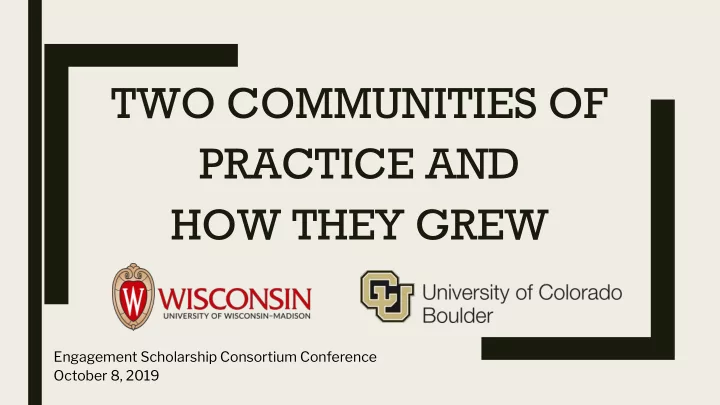

TWO COMMUNITIES OF PRACTICE AND HOW THEY GREW Engagement Scholarship Consortium Conference October 8, 2019
Introductions Megan Miller, MPA Amanda Giguere, PhD Assistant Director, Civic Engagement & Director of Outreach Communications Colorado Shakespeare Festival Morgridge Center for Public Service University of Colorado Boulder University of Wisconsin – Madison Nicole Speer, Ph.D. Jim Hakala, MAT Director of Operations Senior Educator Intermountain Neuroimaging Consortium Museum of Natural History University of Colorado Boulder University of Colorado Boulder Jeanne McDonald, MA Elizabeth Tryon, M.Ed. Assistant Director Assistant Director for Community-engaged Scholarship Office for Outreach and Engagement Morgridge Center for Public Service University of Colorado Boulder University of Wisconsin – Madison
Presentation Overview ● Community of Practice Definition ● How it Started: History, Mission and Goals ● Where We are Now: Successes and Challenges ● Movement Activity ● Small Group Discussion ● Report Out ● Resources and Wrap-Up
What is a Community of Practice? A community of practice is a group of people who share a concern or a passion for something they do, and learn how to do it better as they interact regularly.
Building a Successful Community of Practice Design the community to evolve naturally, to support shifts in focus. • Create opportunities for open dialog within and with outside • perspectives. Welcome and allow different levels of participation. • Develop both public and private community spaces. • Focus on the value of the community. • Combine familiarity and excitement. • Find and nurture a regular rhythm for the community. •
How it Started: History, Mission and Goals Boundary Spanners Engagement staff are profiled as “boundary-spanners,” as they are responsible for the interacting with partners outside of the institution and “community-based problem solvers,” implying that the skills characterizing the work of engagement staff are largely technical and hands on, managing the daily tasks involved with advancing the partnership. (Weerts & Sandman, 2008, 2010)
Where We are Now: Successes and Challenges
Successes CU Boulder UW Madison ● Formal support from Office of Outreach ● Formal support from Morgridge Center & Engagement for Public Service Regular networking and professional Monthly meetings focused on ● ● development events professional development and community building Steering Committee oversees mission ● and vision, plans direction and strategy ● Steering Committee plans regular events and socials Variety of topics covered for ● professional development Variety of topics covered for ● professional development ● List-serv to keep people connected in-between events List-serv, Facebook and LinkedIn with ● more than 350 members regularly Process for co-chair succession ● utilized to share events and job postings planning One of three sponsors of UW-Madison ● 16 events since 2015; hundreds of ● Community University Partnership professionals reached Awards ● Active participation in titling and compensation studies
Challenges CU Boulder UW Madison Maintaining momentum and relevance Lack of systematic succession planning, ● ● to current needs particularly with the chair/co-chair positions Staff turnover affects awareness ● Steering Committee members are ● Recruitment for steering committee ● volunteers who tend to already be overworked and overcommitted in their Timing events for maximum attendance ● units Ensuring community of practice ● Determining the best way to represent ● outlasts any one person community voices in our community of practice created specifically for academic staff Struggles recruiting and welcoming new ● folks to the group
Time to Move!
Small Group Discussion & Report Out ■ Group 1: Starting a Community of Practice with Nicole and Jeanne ■ Group 2: Identifying Common Goals and Practices with Beth and Jim ■ Group 3: Sustaining Momentum and Improving Outcomes with Amanda and Megan
Resources “A Communities of Practice (CoP) Health Check,” Published by Stephen Dale, January 14, 2016 • (http://collabor8now.com/communities-of-practice/a-communities-of-practice-cop-health-ch eck/) Cultivating Communities of Practice: A Guide to Managing Knowledge . Wenger, E., McDermott, • R. A., & Snyder, W. (2002) "Outreach and Engagement Staff and Communities of Practice: A Journey from Practice to • Theory for an Emerging Professional Identity and Community,” Harden, S. & Loving, K. Journal of Community Engagement and Scholarship , Volume 8, No. 2, Fall 2015. T he Community Engagement Professional in Higher Education: A Competency Model for An • Emerging Field . Dostilio, Lina. 2017. • **also a New Companion Guidebook to previous resource (2019) Campus Compact Community Engagement Professional Credentialing Program • (https://credential.compact.org) “Community Engagement and Boundary Spanning Roles at Public Research Universities,” • Weerts, D.J. & Sandmann, L.R. Journal of Higher Education, 2010, 81(6), 702-727.
Thank You! Contact Us Megan Miller, Chair Community Partnerships and Outreach Staff Network megan.miller@wisc.edu Jeanne McDonald, Co-Chair Outreach and Engagement Professionals Network jeanne.mcdonald@colorado.edu
Recommend
More recommend